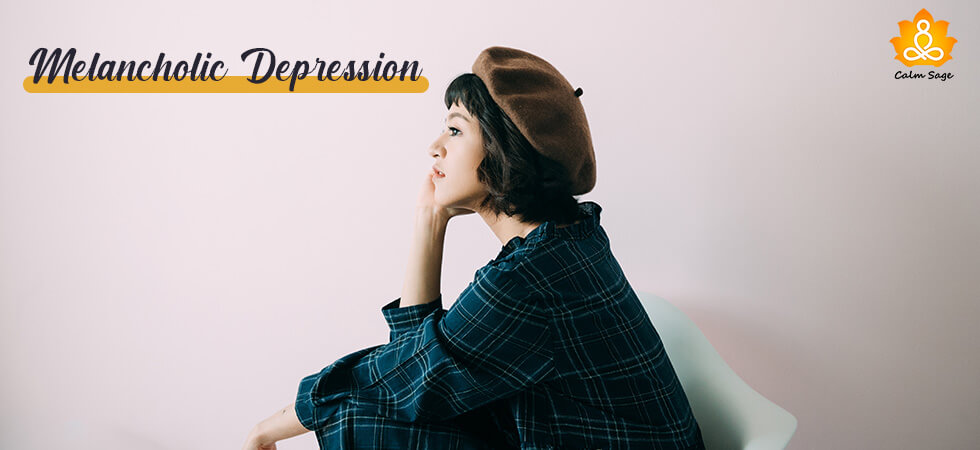Melancholic Depression: What Is It, Its Features & How To Overcome Melancholia

There are many moments in our life where we feel a deep sense of sadness or gloom for absolutely no particular reason at all – also known as melancholia.
Feeling melancholic is nothing new. People have been experiencing this feeling for centuries if not decades but when this feeling of extreme sadness begins to take over our happy moments, that’s when we should not ignore it.
A subtype or a form of Major Depressive Disorder (MDD), melancholic depression can be described as a condition where a person loses all interest and pleasure in day-to-day activities. In the DSM-5, melancholia is a criterion for diagnosing MDD. Therefore, an individual can be diagnosed with Major Depressive Disorder with Melancholic Features.
What Is Melancholia?
Well, when we talk about psychology, melancholia – the term – was first introduced in the 5th century BC by Hippocrates. The Greeks translate melancholia as “black bile”. The symptoms Hippocrates used to describe melancholia are similar to symptoms of depression we use now – fear, changes in appetite, restlessness, insomnia, and sadness.
Features & Symptoms Of Melancholia
Melancholic features when it comes to MDD are specific and used to diagnose melancholic depression.
Melancholia symptoms can be:
- Depressed mood especially experiencing despair or emptiness
- Feeling extremely depressed in the mornings
- Agitation or slow motor functions
- Experiencing changes in weight
- Feeling extreme guilt or shame
- Experiencing sleep disruptions
- Having difficulty maintaining focus for long periods
- Memory loss
- Contemplating self-harm or suicide
- Loss of pleasure in activities
- Loss of reaction to positive events or news
These melancholic features are more likely to occur in individuals who experience or are diagnosed with MDD.
What May Cause Melancholia?
Melancholia episodes are not triggered by a specific event or a situation, rather it is a gradual process. A person may experience loss of interest, pleasure, or happiness even when something good happens in their life.
Individuals who experience MDD with psychotic features are more likely to develop melancholic depression.
While there are no exact reasons that contribute to a person developing melancholia, it is speculated that genetics, past traumatic experiences, chemical imbalances, or a history of depression in the family can be major contributors.
During the diagnosis, the doctor may ask several questions that may include learning more about one’s symptoms. A formal diagnosis is needed to rule out other conditions with similar symptoms such as:
Are There Treatments Available For Melancholic Depression?
For the better part of the treatment of melancholic depression, medications are prescribed as it is suspected that melancholia is not triggered by external factors but is caused by certain chemical imbalances in the brain.
Medications or antidepressants that can be prescribed by a professional psychiatrist can be:
- Selective Serotonin Reuptake Inhibitors (SSRIs)
- Serotonin-Norepinephrine Reuptake Inhibitors (SNRIs)
- Norepinephrine Dopamine Reuptake Inhibitors (NDRIs)
- Atypical Antidepressants: usually prescribed to improve mood.
- Tricyclic Antidepressants (TCAs)
According to a research study by the APA (American Psychiatric Association), tricyclic antidepressants work much better than other antidepressants, psychotherapy, or interventions when it comes to treating melancholy or melancholic depression.
How To Overcome Melancholic Depression?
Not all people are comfortable using prescribed drugs and medications to treat their melancholia symptoms. Since melancholic depression includes experiencing feelings of extreme sadness, loss of enjoyment, loss of interest in day-to-day activities, and fatigue, it can interfere with one’s daily functioning.
First, if you’re experiencing melancholia symptoms, it is recommended that you immediately contact a professional for a formal diagnosis and treatment plan. However, there are some self-help ways you can try (along with medications and treatment) to help reduce the symptoms of melancholic depression:
- Getting regular physical exercise to increase endorphins and dopamine naturally
- Spending time with people you love
- Maintaining a healthy and nutritious diet
- Practicing meditation
- Maintaining a proper sleep schedule (try to get at least 6-8 hours of sleep each night)
Please note that melancholia may make doing the above activities a little difficult but you must keep in mind that incorporating these lifestyle changes into your daily routine will help you in the long run.
You can also reach out to your support system or other online depression support groups. You can also connect with trained and licensed therapists and counselors here.
Melancholia or MDD with melancholic features can make navigating through daily life challenging. However, with a proper diagnosis and treatment, it can become easier to take the necessary steps towards recovery and coping.
If you’re struggling with your mental health, you can reach out to these helpline numbers:
Remember, help is available and you are not alone!
Coping with depression isn’t easy and it is a journey that is full of struggles and challenges but with the right help, it can be manageable.
